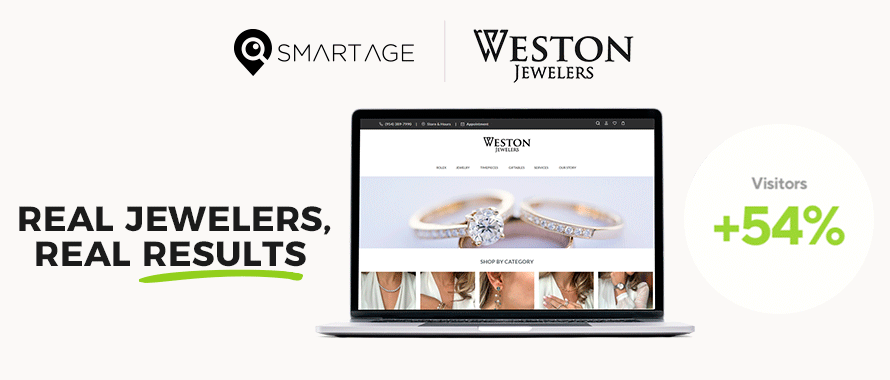Jewelry ECOMM Tech
4 Ways to Boost Brand Awareness Through PPC December 18, 2020 (0 comments)
Any marketing agency that provides eCommerce PPC management services is keenly aware of just how robust this marketing methodology can be for a brand’s bottom line. For instance, advertising statistics from WordStream indicate that businesses that leverage Google Ads tend to generate an average of $2 in revenue for every $1 spent.
While many merchants are capable of driving much more significant ROIs, this figure indicates the lower end of effectiveness for the methodology. For eCommerce retailers who aim to increase their brand awareness, PPC advertising is a prime resource for achieving such goals.
Ready to become more recognizable to consumers the web over? Check out these four strategies for boosting brand awareness through PPC advertising.
Bid On Branded Terms

Most marketers are aware of the importance of branded terms in SEO keyword strategies. However, those same people may likely consider utilizing branded terms in PPC campaigns as a waste of advertising dollars.
After all, if a consumer is conducting a branded search, they are already aware of a company’s existence. Plus, won’t bidding on branded terms potentially cannibalize organic search traffic?
Honestly, without any solid research into the matter, these are reasonable conclusions. But, Google did conduct studies on the use of branded keywords in PPC campaigns for over 400 accounts and found that: “A full 89% of the traffic generated by search ads is not replaced by organic clicks when ads are paused. This number was consistently high across verticals.” Given this information, there are several different reasons that merchants should, in fact, target branded keywords to increase PPC effectiveness.
Firstly, bidding on branded terms helps to ensure a specific retailer will dominate the SERPs. Utilizing this strategy means that a single merchant will likely fill the advertising spots in the results, as well as the organic listings.
Commanding control of the entirety of the space for branded terms accomplishes two things:
- It shows consumers that a brand is a prominent figure in its niche, thereby engendering trust.
- It ensures that competitors are not capturing traffic on another company’s branded terms by preceding its organic listings, thereby stealing clicks and conversions.
Secondly, by bidding on branded terms, retailers can craft incredibly alluring messages that entice consumers to click. This is an important point given that retailers can employ powerful ad extensions that help potential visitors reach the exact page they are looking for and provide incentives and showcase other attention-grabbing elements.

Additionally, retailers can leverage all sorts of other compelling PPC ad formats to generate interest, clicks, and conversions. Through bidding on branded keywords, retailers can produce a much more compelling case to click than with meta descriptions alone.

Finally, by bidding on branded keywords (in addition to unbranded terms), merchants can engage consumers who are already further along in the customer journey (by virtue of already knowing the brand exists) nearest the point of conversion. By employing branded phrases, retailers can likely increase sales by closing as much of the gap from point A to point B as possible.
Employ Targeting and Audience Segmentation
The importance of audience targeting cannot be overstated when discussing PPC effectiveness. After all, each of these tactics is what enables advertisers to reach specific audiences who reside at different points in the sales funnel.
When it comes to employing Google Ads, audience targeting is a necessity for reaching the right users via the Google Display Network. Here, advertisers can target individuals with a variety of effective modalities. For instance, retailers can utilize targeting options such as:
- In-Market Audiences: Consumers Google has determined are researching a specific product or service they are likely to buy.
- Custom Intent Audiences: Targets consumers who have either searched for or are likely to be responsive to products associated with specific keywords.
- Affinity and Custom Affinity: Reaches a broad audience based on their passions, interests, and behaviors.
- Similar Audiences: Groups of users who behave similarly to those who are contained within the retailer’s retargeting list.
Of course, these are only some of the many targeting options provided by Google, let alone those that can be employed on Facebook and other social platforms.
Additionally, retailers can enhance the quality of the leads produced by utilizing PPC segmentation strategies like negative keywords to filter out irrelevant searches, excluding specific web pages, employing dayparting strategies to surface ads during particular times, and other segmentation tactics that help retailers to maximize efforts while conserving PPC budgets.
Craft Copy That Speaks to Expertise
When running PPC ads to generate brand awareness, it is essential to consider how consumers will perceive a business during this vital first impression.
Therefore, retailers ought to seek to craft great ad copy that helps to position the company as an industry expert, the go-to brand for all things related to a given niche.

However, given that PPC platforms like Google Ads give retailers a limited amount of space to catch someone’s attention, pique their interest, and show industry authority, this is a bit of a tall order.
To achieve such a goal, advertisers must learn to make their ads more intriguing by setting themselves apart from the competition in an extremely distilled manner, while leaving readers wanting to know more.
The point is for brands to show that they are the premier resource for a given topic, product or service. Some questions to kick off this process include:
- What is unique or special about the business’s image?
- Are there currently any sales or special offers in effect?
- Has the company won any awards?
- Has the brand been endorsed (in a non-paying capacity) by any notable figures?
By answering these questions and formulating ad copy that speaks to the brand’s expertise and authority, retailers effectively help to remove any potential objections a consumer might have to click through.
Not only will this help to develop brand awareness as a thought leader in the niche, but it will also aid in multiplying PPC conversions.
Target Long-Tail Queries
Targeting long-tail keywords is a popular and effective tactic for enhancing eCommerce SEO strategies. However, utilizing long-tail keywords is just as potent in PPC campaigns.
Long-tail keywords are longer, highly specific, unique phrases that tend to have less keyword competition, and therefore a lower bidding cost. In the eCommerce industry, it is vital to optimize campaigns for these types of queries.
As Chris Anderson, former editor-in-chief of Wired, stated: “The best way to dominate the web in the face of stiff competition is to optimize for long-tail search.”
When implementing long-tail keywords, it is vital that retailers consider searcher intent. Depending on the stage in the sales funnel a consumer resides, they may not be looking for products just yet, but are instead still in the research phase.
Nonetheless, eCommerce retailers likely have an array of long-tail keyword opportunities to leverage that are related to product variants such as:
- Make
- Model
- Color
- Size
- Gender
- Materials
For instance, merchants who sell baby shoes could take a head term like “Converse sneakers” to generate long-tail keywords such as “Black Converse sneakers for babies.”
However, merchants need not merely dream up long-tail keywords and other eCommerce keyword variants related to an industry or product as there are plenty of useful tools to aid in the process.
For example, KeywordTool.io is specifically designed to help marketers uncover potential long-tail keywords by utilizing Google’s autocomplete data to produce results.
Moreover, advertisers can also obtain keyword data from Amazon, YouTube, Bing eBay, and other popular online destinations. Simply type in a head term like “Shoes,” and the tool will turn back a whole list of long-tail keyword suggestions.

Similarly, Answer the Public is another free keyword research tool aimed at producing long-tail phrases. However, unlike KeywordTool.io, this platform focuses on the kinds of questions consumers are asking online. Here, users simply type in a head term like “Headphones” and Answer the Public provides a visual breakdown of the kinds of questions people are asking in defined groups of “how,” “why,” “who,” “where,” “which” and similar qualifiers.
Given that most of these are top-of-funnel questions, Answer the Public is perfect for uncovering long-tail keywords to drive brand awareness. Best of all, both of these keyword research tools are free to use.
When used with a defined strategy, PPC adverts are a powerful means for driving brand awareness online. Unlike other forms of marketing, paid adverts can produce immediate results, helping retailers generate brand recognition quickly while also helping to increase website traffic, leads, and sales.
While learning the ins and outs of utilizing PPC ads to enhance a brand’s public profile can sometimes be more of an art than a science – as is the case in developing catchy copy – it is an invaluable skillset to possess in today’s digital advertising era.
Employ the strategies outlined above to help your eCommerce business build the awareness it needs to thrive in today’s highly competitive eCommerce environment.
------
Thanks, Visiture!


